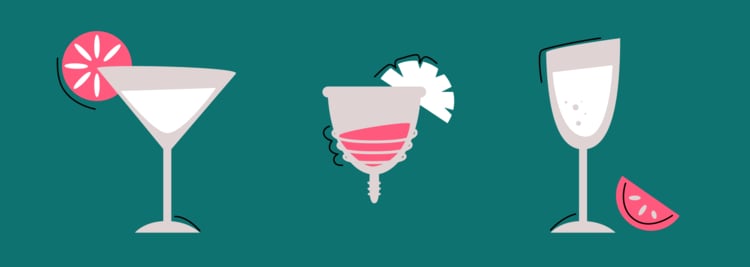Can drinking during your period make you feel better or worse? Many people aren't sure about the link between alcohol consumption and their periods, and anecdotal accounts may be misleading. Here are some popular FAQs about the correlation between drinking and your period.
-
Tracking cycle
-
Getting pregnant
-
Pregnancy
-
Help Center
-
Flo for Partners
-
Anonymous Mode
-
Flo app reviews
-
Flo Premium New
-
Secret Chats New
-
Symptom Checker New
-
Your cycle
-
Health 360°
-
Getting pregnant
-
Pregnancy
-
Being a mom
-
LGBTQ+
-
Quizzes
-
Ovulation calculator
-
hCG calculator
-
Pregnancy test calculator
-
Menstrual cycle calculator
-
Period calculator
-
Implantation calculator
-
Pregnancy weeks to months calculator
-
Pregnancy due date calculator
-
IVF and FET due date calculator
-
Due date calculator by ultrasound
-
Medical Affairs
-
Science & Research
-
Pass It On Project New
-
Privacy Portal
-
Press Center
-
Flo Accuracy
-
Careers
-
Contact Us
Alcohol and Your Period: The Surprising Truth About Drinking on Your Period

Every piece of content at Flo Health adheres to the highest editorial standards for language, style, and medical accuracy. To learn what we do to deliver the best health and lifestyle insights to you, check out our content review principles.
Can you drink during your period?
While you may crave a glass of wine or other alcoholic beverage, drinking during your period can adversely impact your hormone levels. Alcohol can increase the production of both estrogen and testosterone in the body. Too much of either can exacerbate PMS symptoms, especially mood swings and irritability. It also impacts the balance of prostaglandins, which can worsen cramps.
How much you drink and what you drink can affect how you feel. For pregnant people, even a little drinking can result in fetal alcohol syndrome, especially early on in a pregnancy.
You may notice that your alcohol tolerance is lower during your period as well. While everybody is different, knowing whether you become intoxicated faster during your period can help you make responsible drinking choices.
Can alcohol consumption cause cycle irregularities or disorders?
Regular drinking can cause hormonal fluctuations that can lead to both irregular ovulation and periods. Chronic alcohol use can cause reproductive issues, including difficulty conceiving and complete cessation of the menstrual cycle.
The body needs the proper balance of estrogen and progesterone released in specific amounts for ovulation and menstruation to be regular. The effects of alcohol on hormone balance can make ovulation irregular or make it stop entirely.
Does alcohol help cramps?
Some people may say that alcohol can dull the feeling of cramps while drinking. However, alcohol is a diuretic, which means it increases urination and can cause dehydration. And being dehydrated can actually make cramps worse.
Many health professionals recommend increasing your water intake during your period. Your abdominal muscles and uterus will cramp less if you’re well-hydrated. Water also thins the blood and mucus, which makes it easier for your body to pass it. If you’re dehydrated, then you’re likely to have worse cramps (in addition to the rest of the symptoms of a hangover).
Take a quiz
Find out what you can do with our Health Assistant
Alcohol is a diuretic, which means it increases urination and can cause dehydration. And being dehydrated can make cramps worse.
Ultimately, everyone is different. Many people may feel more relaxed with a glass of wine or a cocktail when they’re on their period, which can help ease cramping. The relaxing effects of one or two drinks may help you feel better — just be sure to drink plenty of water when you consume alcohol.
Does alcohol make you bleed more?
Menstrual blood is different from the rest of the blood in your body. In addition to the blood itself, it contains parts of the inner uterine lining and mucus.
After an evening of drinking, you’re likely to be dehydrated. The dehydrating effects of alcohol may make the blood and mucus thicker and thus harder to pass.
What to drink on your period

For people who notice that they become intoxicated more quickly on their periods, drinking fruity cocktails with a high sugar content can intensify the effects of the alcohol by creating a spike in your blood sugar.
Flavored sparkling water or a “mocktail” are good options for when you need to abstain from alcohol at a social event or bar. If you do choose to drink alcohol, be sure to drink more water than usual to stay well-hydrated.
Coffee can also worsen symptoms of PMS. It increases blood pressure and resting heart rate, which can exacerbate tension and anxiety. Tea, sparkling water, or juice are better options during this time of your cycle.
Does drinking alcohol affect fertility?
Drinking alcohol can negatively affect fertility. The effects of alcohol on your hormones may cause irregular or absent ovulation. In addition, alcohol can affect when in your cycle you ovulate. If you're trying to conceive, this means that if you’re hoping to target your fertile window, your timing could be off.
The exact effect of alcohol consumption on fertility isn’t quite understood, although the overall effects of alcohol on the body are negative. Overconsumption — more than three drinks a day, or more than seven to eight drinks per week — can have long-term effects on blood pressure and heart health. During pregnancy and while trying to conceive, these conditions can be dangerous for both parent and baby.
Drinking alcohol can negatively affect fertility. The effects of alcohol on your hormones may cause irregular or absent ovulation. In addition, alcohol can affect when in your cycle you ovulate.
If you are considering IVF or fertility drugs, drinking alcohol can reduce their effectiveness and decrease your chances of viable implantation and live birth. If both partners who are trying to conceive are moderate to heavy drinkers, the chances of conception drop even further, as alcohol has a negative effect on the number and viability of sperm.
Although a glass of wine or a beer may be a treat to help you relax during your period, it’s important to consume alcohol judiciously when you have your period or if you're trying to conceive. Make sure if you do drink that you get plenty of water too, and always drink in moderation.


Hey, I'm Anique
I started using Flo app to track my period and ovulation because we wanted to have a baby.


The Flo app helped me learn about my body and spot ovulation signs during our conception journey.


I vividly
remember the day
that we switched
Flo into
Pregnancy Mode — it was
such a special
moment.
Real stories, real results
Learn how the Flo app became an amazing cheerleader for us on our conception journey.
References
Emanuele, Mary Ann, et al. “Alcohol·s Effects on Female Reproductive Function.” National Institute on Alcohol Abuse and Alcoholism, U.S. Department of Health and Human Services, June 2003, pubs.niaaa.nih.gov/publications/arh26-4/274-281.htm.
“Can Lifestyle Choices Boost My Chance of Getting Pregnant?” Mayo Clinic, Mayo Foundation for Medical Education and Research, 25 Apr. 2020, www.mayoclinic.org/healthy-lifestyle/getting-pregnant/in-depth/female-fertility/art-20045887.
“Alcohol Questions and Answers.” Centers for Disease Control and Prevention, Centers for Disease Control and Prevention, 15 Jan. 2020, www.cdc.gov/alcohol/faqs.htm.
Rossi, Brooke V, et al. “Effect of Alcohol Consumption on in Vitro Fertilization.” Obstetrics and Gynecology, U.S. National Library of Medicine, Jan. 2011, www.ncbi.nlm.nih.gov/pmc/articles/PMC4487775/.
“What Are the Different Drinking Levels?” National Institute on Alcohol Abuse and Alcoholism, U.S. Department of Health and Human Services, www.rethinkingdrinking.niaaa.nih.gov/How-much-is-too-much/Is-your-drinking-pattern-risky/Drinking-Levels.aspx.




